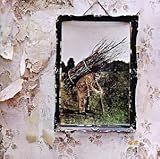
- アーティスト: Led Zeppelin
- 出版社/メーカー: Atlantic / Wea
- 発売日: 1994/07/18
- メディア: CD
- 購入: 4人 クリック: 35回
- この商品を含むブログ (145件) を見る

- アーティスト: Led Zeppelin
- 出版社/メーカー: Atlantic / Wea
- 発売日: 1994/08/18
- メディア: CD
- 購入: 5人 クリック: 23回
- この商品を含むブログ (79件) を見る
承前*1
Led Zeppelin*2の名曲「天国への階段」を巡ってあれこれ。
先日紹介したRobin Turner氏の”Led Zeppelin's Welsh inspiration”*3。実はウェールズのAberystwythに住む”a life-long Led Zep fan”であるPauline Bowenという方が上梓する予定のLed Zeppelin Memoriesという本を巡ってのもの。先ず、Owain Glyndwrというウェールズの叛乱指導者に対するロバート・プラントの傾倒;
但し、Owain Glyndwrの事績と「天国への階段」の歌詞との関係は、記事を読む限りではわからない。さらに、
She claims that Robert Plant came up with the lyrics to Stairway to Heaven, while the band were staying at a farm near Machynlleth.
After a hectic 15-month world tour in 1970, the group decamped to Bron-yr-Aur, a remote cottage with no gas or electricity near Machynlleth.
The group members would occasionally book a room at the nearby Glyndwr Hotel to have a hot bath and also played a number of unscheduled gigs for local people in small halls.
Bowen says Robert Plant developed a fascination with Welsh culture, especially rebel leader Owain Glyndwr.
The multi-millionaire singer has donated money to the Celtica museum in Machynlleth and also unveiled a statue of the iconic Glyndwr in Pennal.
ところで、昨年12月の『AERA』臨時増刊「AERA ROCK HARD!」
The band named a song on the Led Zeppelin III album after the farmhouse. It was called Bron-yr-Aur Stomp and Bowen believes the mystical, philosophical lyrics of Stairway to Heaven were also influenced by Robert’s surroundings in Artists’ Valley.
Lyrics such as “In the tree by the brook there’s a songbird who sings” and “The forest will echo with laughter” contribute to the theory.
Robert Plant has also spoken about his love of the Welsh forests and left Bowen in no doubt that this was a key inspiration for the song.
She said, “They would come to this part of Wales with a lorry carrying food, drink and instruments and sit around the fire writing songs.”
![AERA ROCK HARD ! (アエラロックハード) 2006年 12/10号 [雑誌] AERA ROCK HARD ! (アエラロックハード) 2006年 12/10号 [雑誌]](http://ecx.images-amazon.com/images/I/51WB7TWHBVL._SL160_.jpg)
AERA ROCK HARD ! (アエラロックハード) 2006年 12/10号 [雑誌]
- 出版社/メーカー: 朝日新聞社
- 発売日: 2006/11/30
- メディア: 雑誌
- クリック: 1回
- この商品を含むブログ (5件) を見る
また、赤岩氏は最後の”To be a rock, not to roll”という部分にメデューサ神話の影響を見いだしているが(ibid.)、これはどうなのか。
吟遊詩人たちは、導入部分では楽器を静かに弾きながら、英雄たちのプロフィールを紹介し、ストーリーが激しい展開となり、戦闘などのクライマックスに近づくと楽器を激しく弾き、叩き、物語を盛り上げていったという。「天国への階段」ではアコースティックギターの静かな調べで貴婦人のプロフィールを紹介し、中盤部のドラムスが加わってからの演奏は、エレクトリックギターに変わり、徐々に激しくなり、最後の大団円を迎えるという構成になっている。吟遊詩人たちの語り口をロックに取り入れた見事な演奏をここでは聞くことができるのである(p.61)。
因みに、「天国への階段」というタイトルそれ自体については、ヘロデ王の伝説*5に由来するものであることは明らかだろう。
それはともかくとして、「天国への階段」の歌詞には或る哲学的(宗教的?)決断を迫る部分がある。〈内在性(immanence)〉への徹底的なコミットメント;
おまけ;
Dear lady, can you hear the wind blow?
And did you know, your stairway lies in the whispering wind.
少なくとも私はそんな解釈の存在を知らなかった。また、「天国への階段」をドリー・パートンがカヴァーしていたことも知らなかった。聴いてみたくはあるが。
The lyrics are widely believed to refer to a woman "who is sure all that glitters is gold". She is a drug user, and is buying from her dealer a Stairway to Heaven - in other ways, the drugs will eventually kill her.
http://www.itv.com/news/6b00cb363f64d7473fc6a1e6cefe6cb5.html
*1:http://d.hatena.ne.jp/sumita-m/20070628/1183032395
*2:「レッド・ツェッペリン」という英語と独逸語がごっちゃになった言い方は好きではない。やはり、レッド・ゼッペリンと表記すべきだろう。
*3:http://icwales.icnetwork.co.uk/0100news/0200wales/tm_headline=led-zeppelin-s-welsh-inspiration%26method=full%26objectid=19350208%26siteid=50082-name_page.html
*4:Cf. http://www.isle-of-skye.org.uk/celtic-encyclopaedia/celt_bio.htm
*5:Cf. http://d.hatena.ne.jp/sumita-m/20070508/1178643254 http://d.hatena.ne.jp/sumita-m/20070424/1177430479